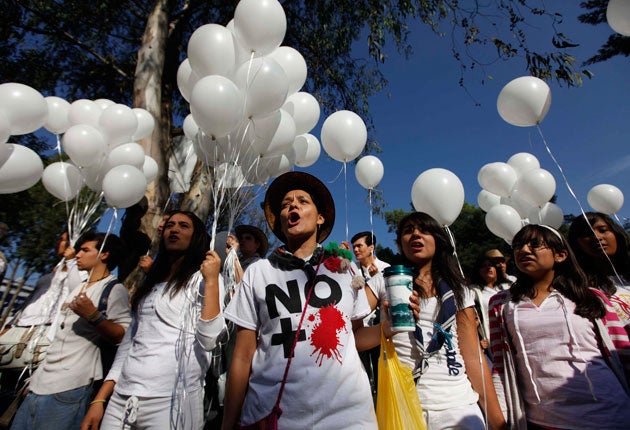Mexico marches over deadly cost of war on drugs

Tired of innocent bloodshed, 90,000 people have participated in a "silent march" in Mexico City to protest against the country's strategy in its "war on drugs", which is estimated to have claimed more than 35,000 lives.
The march, which began three days ago, was led by the poet and journalist Javier Sicilia, whose 24-year-old son was murdered in March. Behind Sicilia, families of victims marched in silence through Mexico City's avenues, holding photos of their lost ones, while young participants covered in red paint held banners bearing slogans "no more blood" and "we're fed up".
"The movement has allowed us to tell our son's story so he doesn't just become another number," says Michelle Mendez, whose son was killed last year. Sicilia has been applauded for unifying the participants. The diverse march was joined by students, trade unions, human rights groups and professionals. Similar protests were held throughout the country.
At busy intersections, local families camped out, waiting to get a glimpse of the protest and cheer as it went by. "This is what all Mexicans want, we all want peace," said Margarita Rodiguez a 50-year-old English teacher. The march ended in the city's main Zocalo Square, where protesters gathered to hear speeches by Sicilia and from other relatives of victims.
The protest leaders called for an end to President Calderón's "drug war", claiming that the increase in military campaigns to stop the drug cartels is only escalating the violence and increasing civilian deaths.
Sicilia said: "The corruption at the heart and the root of the institutions has overtaken us."
Before the march, Calderón rejected the movement's calls, saying the war on drugs was the responsibility of all civilians and an end would allow drug cartels impunity.
But few seemed to be listening as thousands came together to silently show their outrage at the escalating violence. The movement's next plan is to organise an anti-violence pact to be signed in Ciudad Juarez.
Join our commenting forum
Join thought-provoking conversations, follow other Independent readers and see their replies
Comments
Bookmark popover
Removed from bookmarks